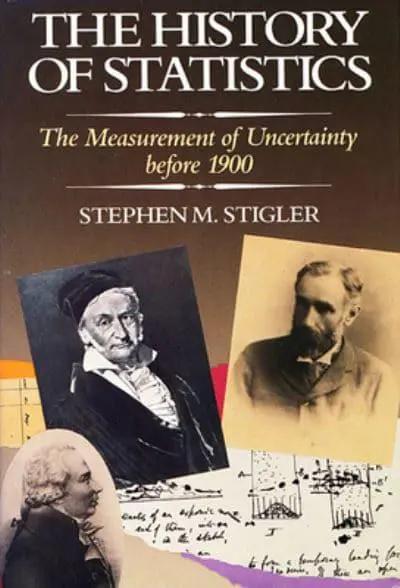The History of Statistics

Ratings/reviews counts are updated frequently.
Check link for latest rating. ( 99 ratings, 16 reviews)Read More
Found a better price? Request a price match

The History of Statistics
Book Hero Magic created this recommendation. While it's new and still learning, it may not be perfect - your feedback is welcome! IS THIS YOUR NEXT READ?
The History of Statistics
Stigler shows how statistics arose from the interplay of mathematical concepts and the needs of several applied sciences. His emphasis is upon how methods of probability theory were developed for measuring uncertainty, for reducing uncertainty, and as a conceptual framework for quantitative studies in the social sciences.
Stigler's book exhibits a rare combination of mastery of technical materials, sensitivity to conceptual milieu, and near exhaustive familiarity with primary sources. An exemplary study -- Lorraine Daston
This magnificent book offers the first comprehensive exploration of the development of statistics from around 1700 to its establishment as a distinct and mature discipline by 1900. Stephen M. Stigler masterfully narrates how statistics emerged from the convergence of mathematical concepts and the demands of various applied sciences such as astronomy, geodesy, experimental psychology, genetics, and sociology.
In The History of Statistics, Stigler delves into numerous intriguing questions that uncover the evolution of statistical methods. How did scientists learn to combine measurements made under different conditions? And what led them to employ probability theory to assess the accuracy of their results? Stigler explores why statistical methods found successful application in astronomy long before they became significant in the social sciences. He also examines the paradox of the introduction of least squares pre-dating the discovery of regression by more than eighty years.
The book critically analyses the major works of prominent figures like Bernoulli, De Moivre, Bayes, Quetelet, and Lexis, often regarded as partial failures, and juxtaposes them with the triumphant contributions of Laplace, Galton, Edgeworth, Pearson, and Yule. Stigler reveals how Galton's probability machine, the quincunx, played a crucial role in leading to significant advancements in the late nineteenth century.
Stigler's emphasis is on the development of probability theory methods for measuring uncertainty in experimental and observational sciences, reducing uncertainty, and conceptualising quantitative studies in the social sciences. He meticulously describes the scientific contexts in which these methods evolved and pinpoints the conceptual or mathematical challenges that hindered the growth of mathematical statistics. Additionally, he highlights the crucial conceptual breakthroughs that allowed for significant progress.
Statisticians, historians of science, and social and behavioural scientists will find in this book a profound understanding of the use of statistical methods and a better comprehension of their promise and limitations. This scholarly endeavour, the result of ten years of research, is a compelling read for anyone interested in the humanistic study of science.
The History of Statistics will enlighten readers on the rich history and development of statistical methods and their integral role in various scientific advancements, while also providing a critical lens through which to appreciate both the potential and the boundaries of statistical techniques.
Book Hero Magic summarised reviews for this book. While it's new and still learning, it may not be perfect - your feedback is welcome! HOW HAS THIS BEEN REVIEWED?
The History of Statistics by Stephen M. Stigler is praised for its deep, almost affectionate exploration of the key figures and their contributions to the field during the nineteenth century. The book is noted for its evocative prose, careful scholarship, and comprehensive analysis, making it both a definitive and enjoyable read on the early development of mathematical statistics. Critics commend Stigler's mastery of technical details and his insightful portrayal of the historical context.

Book Details
INFORMATION
ISBN: 9780674403413
Publisher: Harvard University Press
Format: Paperback / softback
Date Published: 01 March 1990
Country: United States
Imprint: The Belknap Press
Illustration: 28 halftones, 25 line illustrations
Audience: Tertiary education, Professional and scholarly
DIMENSIONS
Width: 156.0mm
Height: 235.0mm
Weight: 662g
Pages: 432
About the Author
Stephen M. Stigler is Ernest DeWitt Burton Distinguished Service Professor Emeritus in the Department of Statistics at the University of Chicago.
More from Science & Nature
View allWhy buy from us?
Book Hero is not a chain store or big box retailer. We're an independent specialist on a mission to help more Kiwis rediscover a love of books and reading!

Service & Delivery
Our cozy 200m2 warehouse in Auckland holds over 20,000 books in-stock so you're not waiting for books to arrive from overseas.

Auckland Pick Ups
We're an online-only store but for your convenience you can pick up your order for free from our warehouse in Hobsonville.

Our Gifting Service
Books make wonderful thoughtful gifts and we're here to help with gift-wrapping and cards. We can even send your gift directly to your loved one.

























